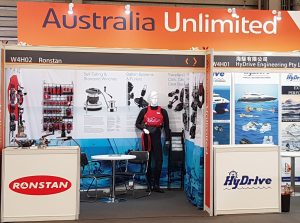-Article by Peter Dowdney, Australasian Sales Manager, Ronstan International Pty. Ltd.
For well over five decades, Ronstan has enjoyed great export success. This success hasn’t come easily and even today, we continue to seek out new markets for our products around the globe. Peter Dowdney, Australasian Sales Manager recently said “We work extremely hard on the relationships that we share with our network of international distributors. They are such pivotal components of our export strategy. We need them to be more than just customers, they need become part of the Ronstan family”.
Finding the right partner in some countries is not always an easy task. Ronstan has had plenty of false starts over the years and not every partnership goes the distance. For the past four years Peter has been concentrating his efforts on developing Ronstan’ s business and brand profile in the Chinese market. There have been many lessons learned along the journey but these are some of the more important lessons that Peter feels any new exporter should know going in:
- Do your market research
It sounds obvious but I am constantly surprised by the number of people that I meet at trade shows that have turned up to an event hoping to find a distributor without doing any prior homework or research. There are probably plenty of examples where this may have happened successfully but it’s a risky strategy and probably not the most cost effective or efficient way to approach what is an important decision. It is much better to learn as much as you can about the key players in the market that you are trying to break into first and then target primary candidates with clear understanding of the lay of the land.
- Consult with the experts
Because there are so many resources and sources of information that are open to us these days that it can be quite difficult to know who the best people are to talk to and who you should believe. My advice is to consult with as many people as you can and then apply a common sense filter to everything that you are told. The starting point for any market research should be:
- Austrade
- Australian & State Chamber of Commerce
- EFIC – Australian Government Export Finance
- State Government Industry Support Services – Trade Victoria
- Industry Peak Bodies such as AIMEX or your local BIA
- Export Education Organisations – Asialink Business
- Other companies that are already exporting to the country you are interested in
- Visit, explore and understand
Having said the above, don’t believe everything that you are told about a new market, you really need to go and see it for yourself. Opinions are formed by people’s own experiences and in markets like China these personal experiences can vary dramatically. You know your business better than anyone else so only you can assess whether a potential distribution partner is going to fit your needs or not. Understanding the culture and business practices of a country like China is critical to your future success. The way that an Australian executive will view an opportunity or negotiate a deal is completely different to how his Chinese counterpart will see and do things. Don’t assume potential partners are being difficult just because they approach things in a different manner.
- Don’t appoint the first person that shows interest in your product
This also sounds obvious but it happens all of the time and everyone you meet in Asia seems to be a distributor! I will give you an example. You receive an order from customer in a country where you don’t do much business and they ask to become your exclusive distributor for that country. You agree simply because you feel it is better to have some representation, rather than none. The problem is that once you have established a distribution agreement, getting out of it can be a difficult process. You need to be mindful that the commercial laws of that country may differ significantly from those of Australia so be careful and do your due diligence before your sign on the dotted line. Doing your homework up front could shield you from a lot of unnecessary angst and expense as you fight to extract yourself from a bad distribution arrangement.
- The negotiations never stop – learn to play the long game.
 Contracts in China are not viewed or treated like they are in Australia. In Australia, if the contract says that the price will be $X, then that is the price and there is no further negotiation on that point. In China, they will often see the contract as being more of a starting point for further negotiations and that specific details contained within, may need to remain somewhat flexible to meet with varying circumstances. I am not saying that contracts are not important in China but it is the negotiation process itself that they see as being the most important element. The deal will only work if there is trust established between the two parties and the contract becomes more of a confirmation of the relationship.
Contracts in China are not viewed or treated like they are in Australia. In Australia, if the contract says that the price will be $X, then that is the price and there is no further negotiation on that point. In China, they will often see the contract as being more of a starting point for further negotiations and that specific details contained within, may need to remain somewhat flexible to meet with varying circumstances. I am not saying that contracts are not important in China but it is the negotiation process itself that they see as being the most important element. The deal will only work if there is trust established between the two parties and the contract becomes more of a confirmation of the relationship.
Ronstan is headquartered in Melbourne, Australia and is owned by its management team. The company has manufacturing in Australia, Denmark and Indonesia and a global network of distributors, enjoying a high profile in the sailing and architectural markets in 45 countries worldwide.



